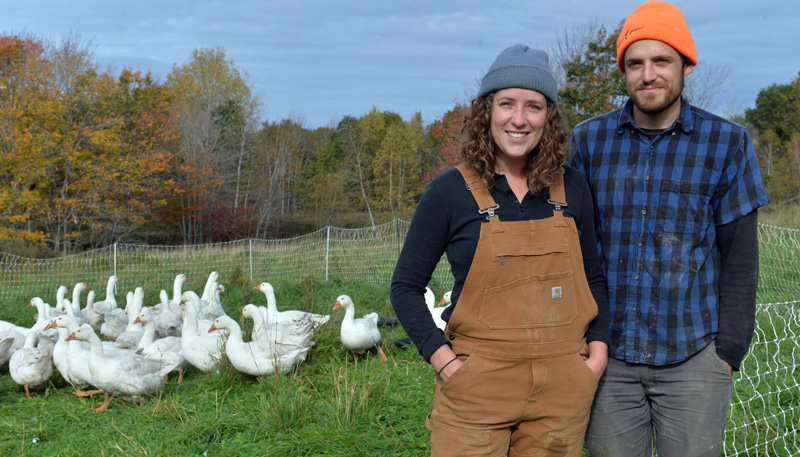
Shannon Lora and Matt Kovarik of Black Earth Forest Farm in Newcastle with their Embden geese. (Paula Roberts photo)
A quest for a locally-sourced Christmas goose ended at Black Earth Forest Farm in Newcastle. The farm raises 600 meat ducks, 50 Embden geese, and has 250 laying ducks. The farm sells its products from Rockland to Portland. Locally, the meat ducks are available at Sheepscot General in Whitefield, Riverside Butcher in Damariscotta, and coming soon to Rising Tide in Damariscotta.
Matt Kovarik runs the farm with help from his partner Shannon Lora. They lease space from Singing Pastures owners John and Holly Arbuckle, at the former Russell Farm at Cowshit Corner.
The holiday geese are fattening up at Black Earth Forest Farm and will be harvested in mid-November. The free-range geese are moved to fresh pasture every day from May through November. They are also fed non-GMO grain. It takes six months to raise a goose to harvesting size and two months for a meat duck. Geese weigh 10-15 pounds each, and cost $11 a pound.
Order early or your goose will be cooked so to speak for getting one for the upcoming holidays.
“We sell out pretty quickly,” Kovarik said of their holiday geese. He advises people looking for a goose for Thanksgiving or Christmas to reserve one early.
They do not sell products at the farm, but a holiday goose can be ordered online.
The farm also raises and sells 100% grass-fed lamb, and has a small tree nursery.
Although they raise 900 birds a year, the farm only overwinters the laying ducks. “They do really well in the winter,” Kovarik said.
Kovarik said he has been raising birds for 10 years. They moved to Maine from Ohio and farmed in Alna and Bristol, before finding land to lease this season in Newcastle.
Kovarik and Lora are in the journeyperson program with Maine Organic Farmers and Gardeners Association, which helps young farmers.
The “goose meat is very flavorful and rich, more akin to grass-fed beef than poultry. The meat is dark red rather than pink like turkey or chicken, and has the most delicious fat that is most similar to olive oil. The oil can be saved after roasting the bird for future recipes. While goose meat is certainly our favorite of all animals we raise, we love and cherish the fat that they provide. We use it year round in our kitchen,” Kovarik said.
Lora said, “Whole roasted goose is so delicious that it is best prepared simply with salt and herbs. It is important to prick or score the skin to render the fat which slowly bastes the meat and keeps it juicy, crisps up the skin, and then provides ample cooking fat for future recipes.”
Lora said the goose should be cooked slowly using a meat thermometer for best results.
Through the centuries, a roasted goose was the traditional meat of choice at holidays. The goose was a common farmyard bird and a natural forager, which made it easy to grow. After the harvest, geese were turned loose in the fields to eat the fallen grain that escaped the reaper, and thus were fattened up for the holidays.
The goose had multiple uses for the farmer, with its down feathers, rich meat and cooking fat. Roasting potatoes in goose fat was and still is a delicacy.
So what happened to the traditional Christmas goose, which was popular in ancient Greece and Roman times and during the Victorian era?
Some blame Charles Dickens’ “A Christmas Carol,” where Ebenezer Scrooge gave the poor Cratchit family a goose for their Christmas dinner, turning it into poor man’s fair.
In America, the truth probably lies in the availability of wild turkeys to early settlers. In the 1940s there was a boom in commercially raised turkeys, which provided a source of cheap meat.
Want the perfect golden goose for the holidays? Don’t go on a wild goose chase. Order early from Black Earth Forest Farm and support a local farmer.
For more information and to order, go to blackearthforestfarm.com, find Black Earth Forest Farm on Facebook or Instagram, or by call 350-6671.



